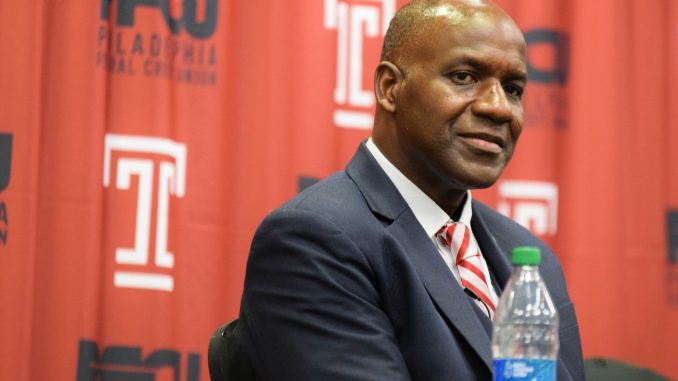
Temple Athletics announced a partnership with Fanatics for the upcoming season to produce co-branded Temple jerseys for fans to purchase. Athletes from men’s and women’s basketball, football, volleyball, lacrosse and men’s and women’s soccer will earn a percentage of the sales from merchandise featuring their names.
“These group licensing agreements are things that I found were low-hanging fruit for our students,” said Justin Miller, executive senior associate athletics director. “It doesn’t require a significant amount of energy or time. They simply opt in, and then they’re participating in the program.”
The agreement will begin during the upcoming Fall semester with hopes of expanding beyond the initial sports.
The announcement came at The Temple University Alumni Association and the Temple Owl Club’s information session Tuesday to discuss Temple Athletics’ relationship with the NCAA’s Name, Image and Likeness policies. Temple’s NIL officials also implored alumni to participate in fundraising for Temple student-athletes as the university continues to come up short on donations to comparable schools.
Hosted by Ed Stoner, executive senior associate athletic director of external operations, the presentation featured Temple Athletics Director and Vice President Arthur Johnson, Executive Director of the TUFF Fund Andy Carl and other members of the athletics department.
Stoner outlined the Owl Club and TUFF Fund’s goals to keep up with peer institutions that receive more alumni donations than Temple.
The Owl Club has around 2,000 members and raised about $2 million last year in contrast with Central Florida, whose 10,000 donors raised more than $43 million, Stoner said. He also compared Temple to Charlotte, who joins the AAC this fall; Charlotte raised $4.16 million with 1,500 donors.
“As I speak with more and more folks who are running collectives, as I sit on phone calls, we are woefully behind,” Carl said. “We lack participation, we lack understanding, we lack financially.”
The Owl Club and TUFF Fund are not connected, said Kristy Bannon, the executive senior associate athletics director for compliance and student affairs. While the Owl Club is connected to the Athletics Department, the TUFF Fund is a third-party collective, not affiliated with the university, that connects student-athletes to the local community via NIL.
“We want to make sure our student athletes can be as active in this space as they want,” Bannon said. “But we have to maintain the NCAA parameters and the state law parameters.”
Temple’s disadvantages are apparent and provide a call-to-action. Owl Exchange, a program where local businesses can contact any registered Temple athlete to begin a NIL transaction, and several Owl Club programs were referenced as ways for alumni to make a difference.
“I’ve looked at NIL as an opportunity for over two years now,” Carl said. “The community that Temple University is surrounded by and is immersed in and embraces needs help. We have phenomenal representatives of our university, and they are on our courts, our fields, our pitches. They have the ability to really impress upon the community some of the changes that our student-athletes are passionate about.”


Be the first to comment